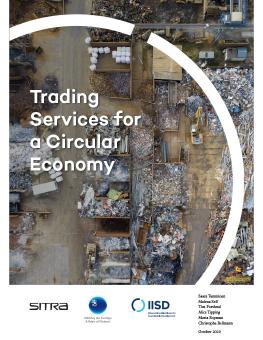
Trading Services for a Circular Economy
This joint report by IISD and the Finnish Innovation Fund Sitra reviews the role that services play in supporting circular economy business models and draws on new empirical research in the form of a survey and set of interviews to identify how firms buy and sell services to support their circular economy activities and the extent to which they buy and sell these services internationally. In addition, it reviews the impact of digitalization on services and services trade and how this relates to the transition to a more circular economy. The report also identifies barriers to the international trade of services relevant to the circular economy and suggests ways in which these barriers might be reduced through unilateral or cooperative trade policy action.
In recent years, governments have been looking for solutions to the environmental challenges associated with unsustainable patterns of natural resource extraction, processing, and use. Many countries have adopted roadmaps or guidelines for a transition toward a more circular economy—a model that promotes enhanced resource efficiency and the decoupling of economic growth from extractive, wasteful, and polluting processes.
Moving from a linear, extractive produce–use–discard model to a more circular approach will involve a paradigm shift and significant changes to existing business models. In today’s highly integrated world economy, international trade will play a critical role in enabling this transition by facilitating the diffusion of circular solutions and exploiting international comparative advantages. While most thinking in this area has focused on the role of trade in goods, much less attention has been paid so far to the role of trade in services in supporting this transition, although services play an essential role in supporting circular economy businesses along the value chain.
This report compiles new evidence on trade in services related to the circular economy based on a survey conducted among 96 individual firms involved in circular economy business models, complemented by a series of in-depth interviews. The results provide some initial insights on services and trade in services trade related to the circular economy—topics that have not been deeply researched until now. The results indicate that a wide range of services are relevant to the circular economy, including recycling services, research and development and other professional services like IT services. Many of the respondents were very specialized micro or small to medium-sized enterprises, a surprisingly high proportion of which were engaged in international trade in services, in particular via mode 1 (digital trade) and mode 3 (commercial presence offshore).
While 40% of survey respondents did not report encountering barriers to the import or export of services related to the circular economy, but others reported specific barriers created by differences in regulation, particularly regarding the treatment of waste and regarding standards for reporting on environmental impact. These specific barriers, in addition to those commonly found in the trade of digital or digitally enabled services (which include many services relevant to the circular economy) suggest that increasing access to services traded via mode 1 and integrating market access for goods and services relevant to the circular economy could be opportunities to support the transition to a more circular economy.
You might also be interested in
Agreement on Climate Change, Trade and Sustainability: A landmark pact for trade and sustainability
The ACCTS pact, signed by Costa Rica, Iceland, New Zealand, and Switzerland, aligns trade and environmental policies, tackling fossil fuel subsidies, eco-labels, and green trade.
Addressing Carbon Leakage: A toolkit
As countries adopt ambitious climate policies, this toolkit examines strategies to prevent carbon leakage—when production and emissions shift to nations with weaker climate policies—and explores the trade-offs of each approach.
Why Trade Matters in the Plastic–Pollution Treaty Negotiations
The global push to end plastic pollution by 2040 highlights the critical intersection of trade and environmental action, with upcoming INC-5 negotiations focusing on reducing plastic production, consumption, and waste within a fair and effective international framework.
Unlocking Supply Chains for Localizing Electric Vehicle Battery Production in India
This study aims to highlight the key supply chain barriers in localizing electric vehicle (EV) battery cell manufacturing in India. It summarizes consultations with 12 companies, as well as experts and policy-makers, to determine the crucial challenges and opportunities in localizing battery manufacturing in India.